- Home
- Allison Brennan
Stalked
Stalked Read online
The author and publisher have provided this e-book to you for your personal use only. You may not make this e-book publicly available in any way. Copyright infringement is against the law. If you believe the copy of this e-book you are reading infringes on the author’s copyright, please notify the publisher at: us.macmillanusa.com/piracy.
You have to learn the rules of the game.
And then you have to play better than anyone else.
—Albert Einstein
CONTENTS
Title Page
Copyright Notice
Epigraph
Chapter 1
Chapter 2
Chapter 3
Chapter 4
Chapter 5
Chapter 6
Chapter 7
Chapter 8
Chapter 9
Chapter 10
Chapter 11
Chapter 12
Chapter 13
Chapter 14
Chapter 15
Chapter 16
Chapter 17
Chapter 18
Chapter 19
Chapter 20
Chapter 21
Chapter 22
Chapter 23
Chapter 24
Chapter 25
Chapter 26
Chapter 27
Chapter 28
Chapter 29
Chapter 30
Chapter 31
Chapter 32
Chapter 33
Chapter 34
Chapter 35
Chapter 36
Chapter 37
Chapter 38
Chapter 39
Chapter 40
Chapter 41
Chapter 42
Chapter 43
Chapter 44: Epilogue
Back ad
Also by Allison Brennan
Praise for Allison Brennan
Copyright
About the Author
CHAPTER ONE
Present Day—New York City
Dark cosmic humor was the only explanation as to why FBI Special Agent Suzanne Madeaux was investigating a murder at Citi Field instead of sitting on the first-base line with a beer. Proof that life wasn’t fair.
Suzanne stuffed her thick dark blond hair under her Mets cap and left her cool air-conditioned sedan for the early dawn New York summer. The weather didn’t bother her—she was born and raised in Louisiana, and New York had nothing on the South for humidity—but the noise from nearby LaGuardia grated on her nerves.
She looked up at the Citi Field stadium and sighed. She’d had a ticket to last night’s game and had to give it away because of work. Late to bed, early to rise, no time for her one vice—baseball and beer. Two vices. Now her team was on the road for nearly two weeks and she’d only be able to watch them on television. Sometimes, she hated her job.
She flashed her badge and was let under the crime scene tape. In addition to dragging her out of bed for a case outside of her jurisdiction, her boss had given her no information about why she had to get her ass out to a Queens homicide after working until two a.m. Murder didn’t usually fall under the purview of the FBI, and she had no active serial killer cases.
She’d thought taking the position of liaison with NYPD for multi-jurisdiction violent crimes would be a career boost, but the nominal pay increase didn’t come close to making up for her longer hours or the shit she had to deal with from some of the cops who didn’t like feds. She had the authority to take jurisdiction, run a case jointly, or keep it local. Considering she had tickets to the first Mets game when they returned—against the Red Sox—she definitely planned to let NYPD keep this case.
“Mad Dog!” a male voice called out.
Suzanne cringed at her nickname. She’d earned it years ago when she had a verbal battle with the media over a brutal murder, but she hated when cops used it. She turned to find the jerk in the crowd and give him the evil eye. She’d learned it from her Cajun grandmother and it worked wonders.
Instead, she said, “Shit.”
“Good to see you, Suzi.”
Detective Joe DeLucca. She should have known. Most of the cops didn’t dare call her Mad Dog anymore, but DeLucca was one of the few she couldn’t intimidate. Probably because not only did he know he was sexy, but also he was one of the best detectives on the force. If she was a mad dog, he was a hunting dog—never gave up the trail until he caught the bad guy.
She stared at him. “You can call me Agent Madeaux, or you can call me Suzanne, but if you call me Suzi again, I’ll break your thumb.”
He grinned, all Italian, all cop. “Promise?” A lesser woman would have swooned. Suzanne kept the swooning in check. No use stroking his inflated ego.
DeLucca—one of her ex-boyfriends. Damn, her exes were adding up. Why was she surprised? Was she ever going to learn not to date cops?
Probably not. Cops were some of the few who understood her schedule, her drive, and, well, her. She never had to explain why she was late, never had to talk about her cases unless she wanted to, and never had to curb her language.
But there were certainly problems dating within her profession. Like running into ex-boyfriends at crime scenes.
“Did you call me out here to apologize for being an asshole or because you need the big guns?”
He winked. “Maybe I just wanted to see you again.”
“Good-bye.”
“Hold up. Damn, you’re touchy today.”
“It’s seven in the morning and I haven’t had enough coffee. I’m at Citi Field, but not watching a game. And I was paged in bed, so I didn’t even get to run. No run, not enough coffee, makes me bitchy.”
Thing was, she still liked Joe DeLucca. But he was divorced with a psycho ex-wife and a son his ex used to keep Joe close to the nest. Suzanne couldn’t blame Joe for picking his kid over his girlfriend. She’d do the same thing, if she had a kid. Which as she was single, thirty-five, and had had no long-term relationship in years was fast becoming unlikely.
An airplane from LaGuardia took off, drowning out whatever Joe was saying. He waited, then repeated, “Tell me how your business card found its way into my victim’s pocket.”
“Who’s the victim?”
“No ID, purse stolen. We ran plates on the nearby cars, and we think the woman is Rosemary Weber.”
“You’re not sure?”
“You tell me.”
He lifted the bright yellow tarp to reveal a body. By the extensive pool of drying blood she was killed right here.
“It’s her. What happened?”
He dropped the tarp and stared at Suzanne. “Tell me how you know her.”
“Don’t interrogate me, Joe.” He was just doing his job, but she didn’t appreciate his all-cop tone. “I knew her because she’s writing a damn book on the psycho killer who suffocated four teenage prostitutes between October of last year and February, when SWAT saved the taxpayers the cost of a trial. I worked the case with Vic Panetta.”
“Cinderella Strangler?”
She rolled her eyes. “I hate that name. The killer suffocated the victims, took one of their shoes, and the press’s label on the case stuck.”
“Did you meet with Weber?”
“Twice, because my boss made me. The first time was brief because I was called out to a scene; the second time was the longest hour of my life, where she shared her focus on the book and how she wanted my help. I told her I needed approval from national headquarters before I said one word about the case; then I pleaded with my boss to deny her request. I have no idea where it is in the process.”
Her explanation appeased DeLucca, and he said, “She was stabbed once, below the sternum, bled out fast, according to the coroner’s preliminary exam. He’s getting ready to transport the body, but I wanted you to see the layout
first.” He motioned to a uniform near the coroner’s van and made a circular motion with his hands to “wrap it up,” releasing the body to the coroner. He stepped away and Suzanne followed. “Body was found by two fans leaving the game at eleven thirty p.m. Coroner says she died sometime during the game, between ten and eleven. No witnesses, no physical evidence. The crime scene techs have already been through here and they’re on a wider sweep now, I have uniforms canvassing, but what really sucks is that there are no security cameras over here. They have them at entrances and exits, but not covering the lot itself.”
Suzanne knew that, from being a longtime patron of baseball games. Probably anyone who’d ever been to a Mets game could find loopholes in security without much effort.
“Robbery?” Suzanne asked.
“No purse, and it’s obvious the killer removed jewelry, but…” His voice trailed off.
“You don’t think it’s a robbery.”
“I don’t know enough yet, but in a robbery turned south I’d expect defensive wounds.”
“She had none?”
He shook his head.
“You think she knew her attacker.”
“Or he was waiting for her.”
“Meaning she was a specific target.”
DeLucca made a noncommittal grunt, but Suzanne had nailed it.
“She used to be a crime reporter, before she wrote books. I don’t envy you—there’s probably a lot of people she pissed off.”
He narrowed his eyes. “Me?”
“Yeah, you. This is a straight-up homicide, nothing federal about it.”
“Your card was in her pocket. She was writing a book about your investigation. Her murder could have a connection.”
“This isn’t federal.” Though her brain couldn’t help but tick off all the players involved in the Cinderella Strangler case. She wondered if any of them had the capacity for murder. “Now, what do you really want me for?”
“Other than naked in my bed?”
She glared at him, discreetly looking around to make sure none of the uniformed cops heard him. “Knock it off, DeLucca.”
He grinned. “Your help.”
“You don’t need my help.”
“Admitting I’m better at my job?”
“Admitting I’m swamped and don’t need another investigation eating into my free time and costing me tickets to a winning Mets game.”
“You were here last night?”
“Supposed to be here. Got stuck on frickin’ paperwork on a bust I worked with your brothers in blue in Brooklyn.” His dark eyes probed hers, and she said, “Dammit, DeLucca, you don’t need me.”
“Wallet gone, a ring appears to have been taken off her finger—we’ll confirm that with next of kin. But that car she was parked next to? The witnesses said they got here early and tailgated. Went in just before the first pitch. Space next to them was empty because they’d spread out, so she got here after the game started. No ticket stub found on her or in her vehicle.”
“And?”
“She’s in the damn parking lot.”
“Maybe she was going to buy from a scalper. Or at Will Call. Or it’s in her missing purse.”
“We’re looking at everything. But who comes to a game alone?”
Suzanne raised her hand.
“You’re not normal.”
She rolled her eyes. “Joe, I don’t want the case.”
“New stadium, family friendly, no real history of trouble. Break-ins, car theft, but nothing like this. Anything about the Cinderella case that was wonky?”
“No. The killer’s dead, taken out by FBI-SWAT. Clean kill. Weber wanted to write about the whack job’s psycho head.” And she was far too interested in the two civilian “consultants” whose names were supposed to be sealed. Damn, was Weber’s murder connected to her closed case?
“Was Weber working on anything else?”
“Don’t know.”
DeLucca looked at her again with his damn bedroom eyes.
“Fine. You win. You want to split this?”
“I’d rather work side by side.”
“Not going there.”
“Oh yes, you will.” He grinned.
“I’ll take victimology; you take the crime scene. Let me know when the autopsy’s done, and an ETA on trace evidence. If you need the FBI lab, let me know and I’ll expedite for you.”
“Dinner, tonight.”
“Not on your life.” Suzanne started walking away. A plane flew almost directly overhead and she didn’t hear DeLucca.
“Great!” he shouted after her. “See you then!”
She turned around. “I didn’t agree to anything.”
“Sure you did. Seven p.m., Roberta’s.”
“No.”
But she knew she’d be there. Worse, he knew she’d be there. It had been their favorite dinner spot when they were involved. She hadn’t been there in over a year, since they’d split.
But first things first. Time to find out what Rosemary Weber was really doing in the parking lot of Citi Field if she wasn’t going to the game. Joe DeLucca was right—this wasn’t a robbery. This was personal. The killer wanted Rosemary Weber dead. If Suzanne could figure out the why, it would lead them directly to the who.
CHAPTER TWO
Fifteen Years Ago
The night my sister died, our mother gave us the Game of Life.
Mom bought us guilt presents because, as Rachel said, she knew what she was doing was wrong. She thought if we just played quietly in the attic, we’d ignore what went on downstairs. But sound travels in old houses, and even if Mom said it was “just a party,” we knew better.
Dad had sort of finished off the attic two years ago, putting in insulation and a space heater and hooking up cable and Nintendo. It became my sanctuary, for me more than for my sister: I guess I just liked having my own private hideout. Mom bought a couple of beanbag chairs and two long, narrow throw rugs that fit the space when laid out side by side.
We were up there with our new game the night of the last party.
It took me nearly an hour to set everything up because all of the plastic pieces came attached to one frame and I had to break each one off. I didn’t ask Rachel to help because she was in a bad mood, pretending to read. I knew she wasn’t reading because she never turned a page in her book. The sound of the rain pounding on the pitched roof would have been scary if I was alone, but I wasn’t scared with my sister here.
“Ready,” I said. “There’s no purple car; do you want blue?” Purple was Rachel’s favorite color. Blue was mine.
“You can have blue.” Rachel sighed and put the unread book down. She picked up the red car.
I began to explain the rules, but Rachel cut me off. “I’ve played it before, at Jessie’s house.”
“Is that why you’re mad? Because Jessie said you couldn’t come over tonight?”
Rachel shrugged. “It’s not her fault.”
That was it. I had only just turned nine, but I knew my sister better than anyone, even our parents. “I wish Grams was here.”
“Yeah.”
Grams lived in Florida most of the year. Her arthritis was so bad, she could hardly walk when it was cold. Rachel and I always spent spring break with her, and we never wanted to come home. Grams came back to Newark in May and stayed for the summer. After Grandpa died two years ago, she stayed in the guest room and Mom and Dad didn’t have parties. They became almost normal parents.
We played quietly, but as the party got louder Rachel started getting mean. When she had to pay income tax, she leaned back and said, “I can’t concentrate.”
“It’s just the luck of the spinner,” I said. “But we can play something else. Mario Kart?”
She closed her eyes. “I hate them.”
My stomach hurt. She was talking about Mom and Dad. I didn’t like this Rachel. I just wanted everyone to be happy and like each other.
“Remember last time when we snuck out and got ice cream?” I said. �
�Want to do that again?”
“It’s raining too hard. I’m not mad at you, Petey, I just don’t want to be here, okay?”
“I know.” I bit my lip. “What about poker?”
“You’ll beat me at that, too.”
“I’ll let you win.”
She laughed, and my stomach hurt less because Rachel’s laugh makes me smile. She jumped up and tickled me. “You’re lying, munchkin.”
I giggled. “Blackjack? Yahtzee? I’ll give you a head start on Mario Kart, a whole lap if you want.”
Rachel sighed and rolled over to her back. The rain fell so fast I couldn’t separate individual raindrops. “Petey? Would you really want to live with Grams?”
“Live? Like forever?”
“When we visit next month, I’m going to tell Grams everything. She’ll let us stay. Maybe she’ll never come back to Newark, either. She only visits because of us.”
The pain in my stomach hurt more than ever. “Don’t do that. It’ll make Grams sad.”
She put her chin on her hand and looked at me. “I’m much older than you. I’ll be twelve next week; I know what’s best. Look at it this way: Either Grams tells Mom and Dad to stop with the stupid parties and we stay here without all this weird stuff, or we get to live in Florida. Right? And Grams’ friend Larry will take you fishing. Remember last year? We had a lot of fun on his boat.”
True. But Dad took me fishing, too. Sometimes. I bit my lip when I remembered I hadn’t gone fishing with Dad since before Grandpa died, because Grandpa always went with us.
“Mom and Dad would be sad.” I sounded like I was going to cry, and I didn’t want to be a baby, but I didn’t want anything to change that much. I just wanted a normal family.
“If they’re sad, they can cut out this shit.”
My eyes widened. “You said shit.”
“So did you.”
“Only because you said it first.”
Rachel smiled at me, but it was a sad face. I wished she didn’t think I was a little kid. I was nine, in third grade, and I was smart, too. All my teachers said so. They had wanted me to skip third grade, but my parents said no because I’m shorter than all the other third graders.
“Think about it, Pete, okay? I won’t say anything if you’re not okay with it.”
I didn’t believe her. Rachel was lying to me. I knew it deep down and didn’t know how I knew. Maybe because she wasn’t looking at me? Like when she said she wasn’t sneaking out to visit Jessie last month, but she did, anyway.

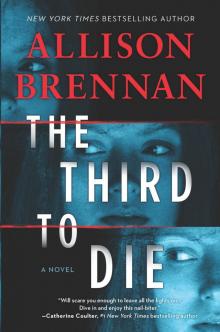 The Third to Die
The Third to Die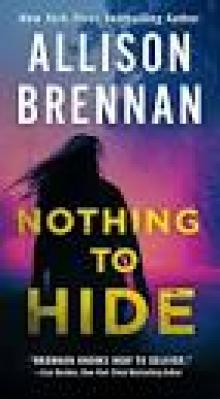 Nothing to Hide
Nothing to Hide No Way Out
No Way Out Cold as Ice
Cold as Ice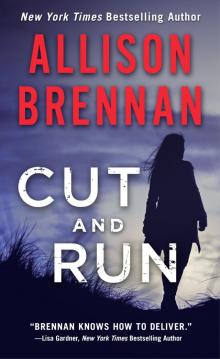 Cut and Run
Cut and Run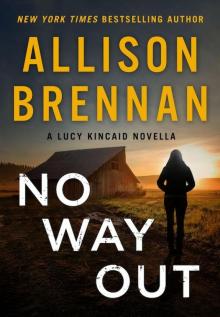 No Way Out (Lucy Kincaid Novels)
No Way Out (Lucy Kincaid Novels) Storm Warning
Storm Warning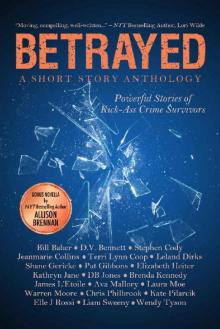 Betrayed: Powerful Stories of Kick-Ass Crime Survivors
Betrayed: Powerful Stories of Kick-Ass Crime Survivors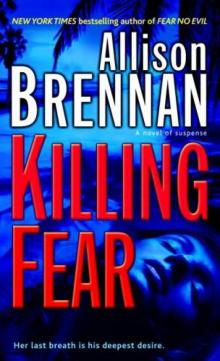 Killing Fear pb-1
Killing Fear pb-1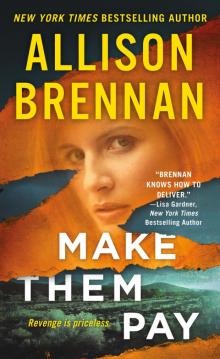 Make Them Pay
Make Them Pay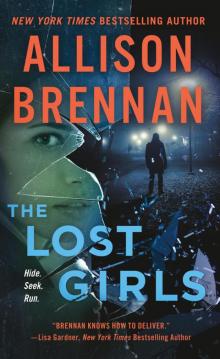 The Lost Girls
The Lost Girls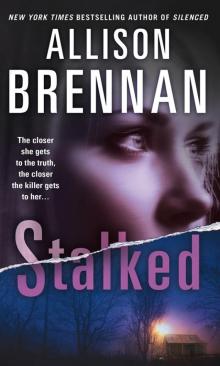 Stalked
Stalked Killing Justice
Killing Justice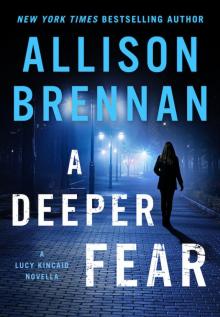 A Deeper Fear
A Deeper Fear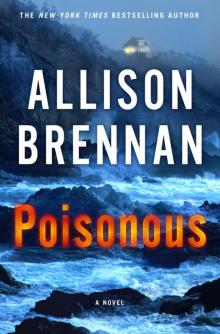 Poisonous
Poisonous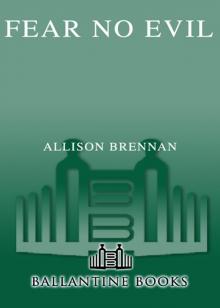 Fear No Evil
Fear No Evil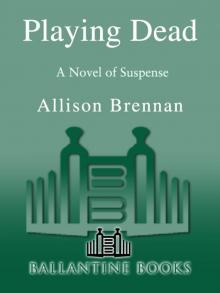 Playing Dead
Playing Dead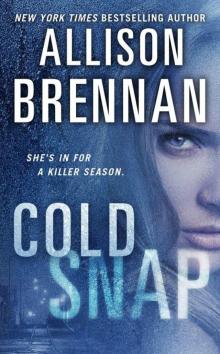 Cold Snap
Cold Snap Vacation Interrupted
Vacation Interrupted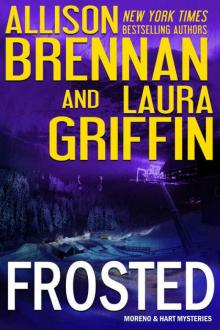 Frosted (Moreno & Hart Mysteries)
Frosted (Moreno & Hart Mysteries)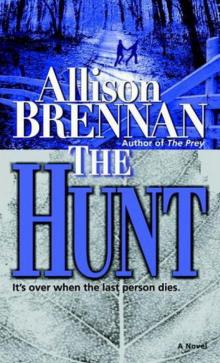 2 - The Hunt
2 - The Hunt Stolen
Stolen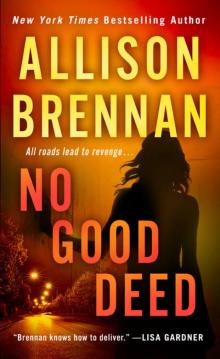 No Good Deed
No Good Deed Cutting Edge
Cutting Edge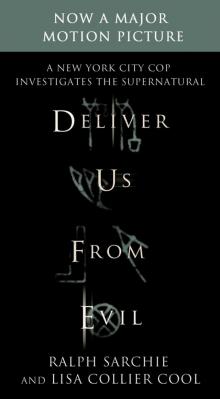 Deliver Us from Evil
Deliver Us from Evil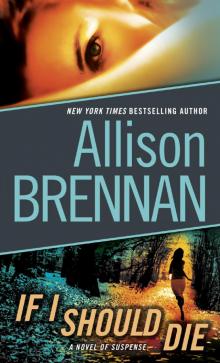 If I Should Die
If I Should Die Speak No Evil
Speak No Evil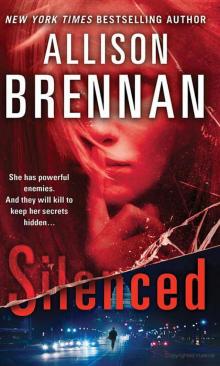 Silenced lk-4
Silenced lk-4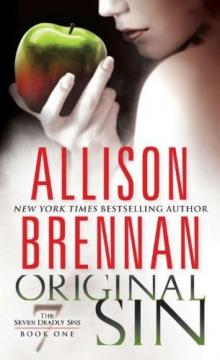 Original Sin sds-1
Original Sin sds-1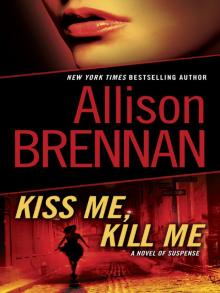 Kiss Me, Kill Me lk-2
Kiss Me, Kill Me lk-2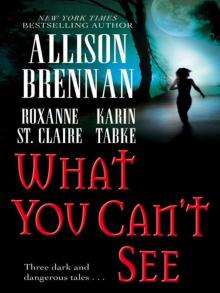 What You Can’t See
What You Can’t See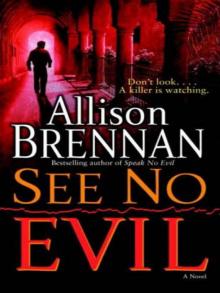 See No Evil
See No Evil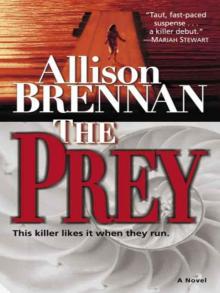 The Prey
The Prey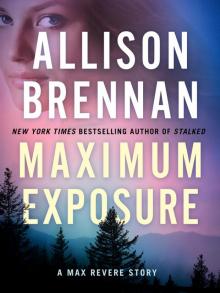 Maximum Exposure
Maximum Exposure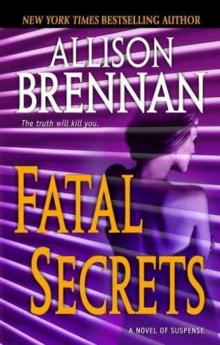 Fatal Secrets f-2
Fatal Secrets f-2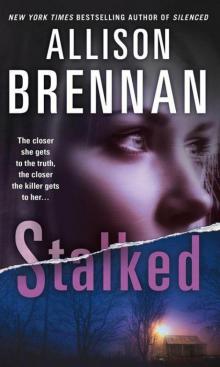 Stalked lk-5
Stalked lk-5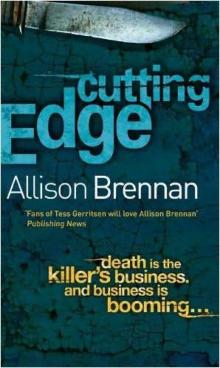 Cutting Edge f-3
Cutting Edge f-3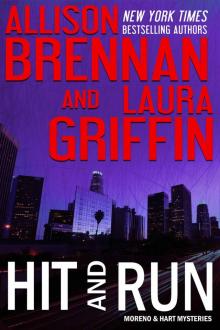 Hit and Run (Moreno & Hart Mysteries)
Hit and Run (Moreno & Hart Mysteries)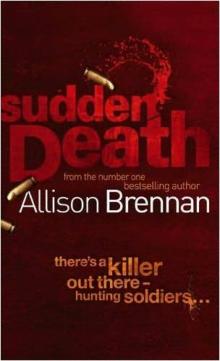 Sudden Death f-1
Sudden Death f-1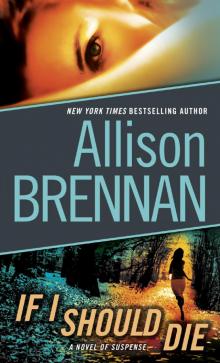 If I Should Die lk-3
If I Should Die lk-3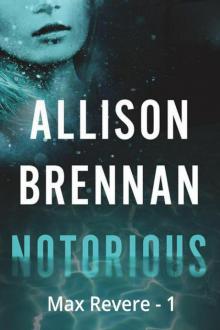 Notorious
Notorious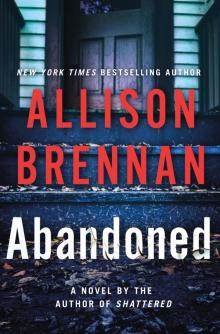 Abandoned
Abandoned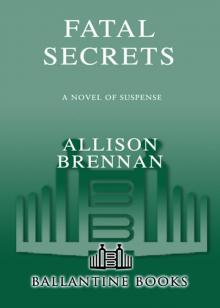 Fatal Secrets
Fatal Secrets The Hunt
The Hunt Carnal Sin sds-2
Carnal Sin sds-2 Love Is Murder
Love Is Murder Lost and Found
Lost and Found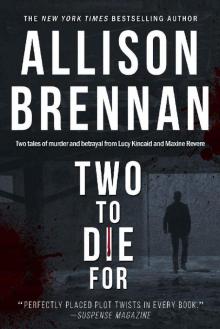 TWO TO DIE FOR
TWO TO DIE FOR Breaking Point
Breaking Point Best Laid Plans
Best Laid Plans Carnal Sin
Carnal Sin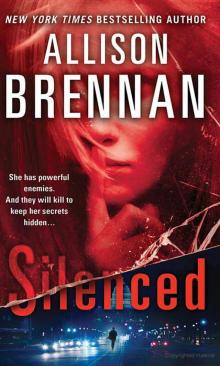 Silenced
Silenced Dead Heat
Dead Heat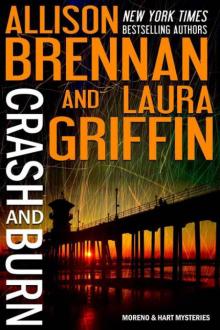 Crash and Burn
Crash and Burn Sudden Death
Sudden Death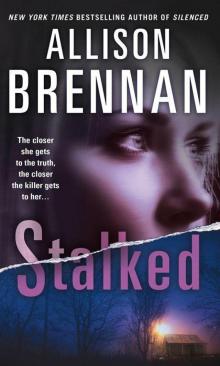 Lucy - 05 - Stalked
Lucy - 05 - Stalked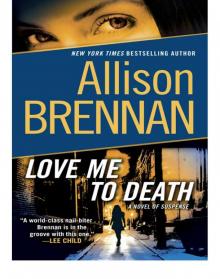 Mortal Sin
Mortal Sin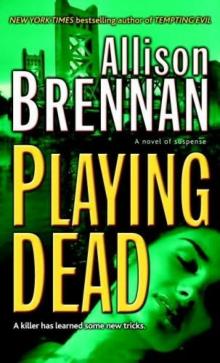 Playing Dead pb-3
Playing Dead pb-3 Kiss Me, Kill Me
Kiss Me, Kill Me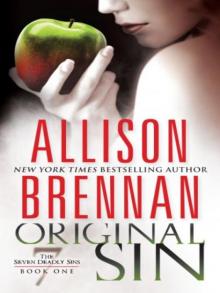 Original Sin: The Seven Deadly Sins
Original Sin: The Seven Deadly Sins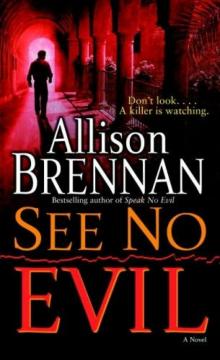 See No Evil e-2
See No Evil e-2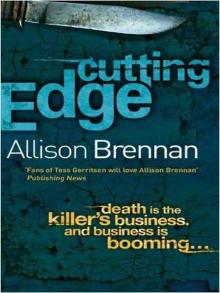 Cutting Edge: A Novel of Suspense
Cutting Edge: A Novel of Suspense Original Sin
Original Sin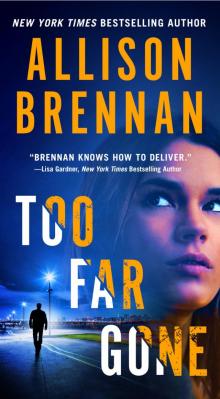 Too Far Gone
Too Far Gone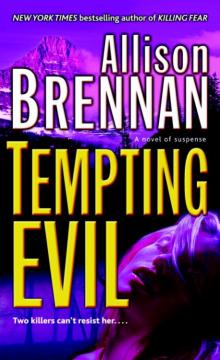 Tempting Evil
Tempting Evil Shattered
Shattered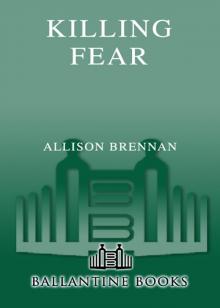 Killing Fear
Killing Fear Murder in the River City
Murder in the River City Love Is Murder (lucy kincaid)
Love Is Murder (lucy kincaid)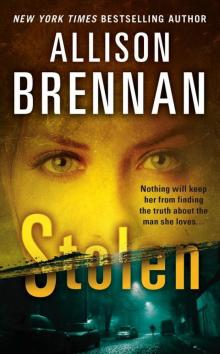 Stolen (Lucy Kincaid Novels)
Stolen (Lucy Kincaid Novels)